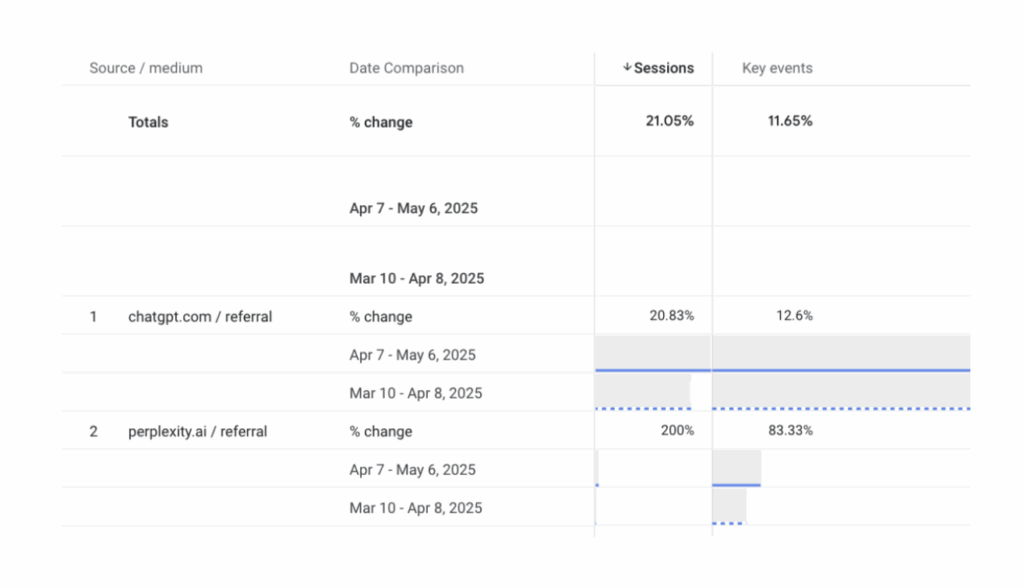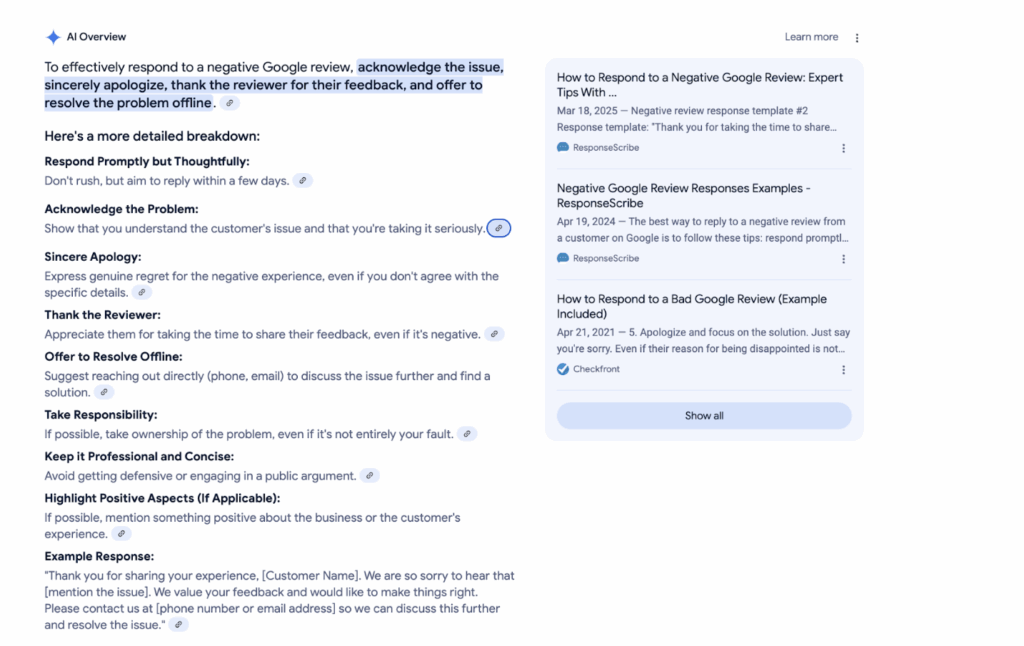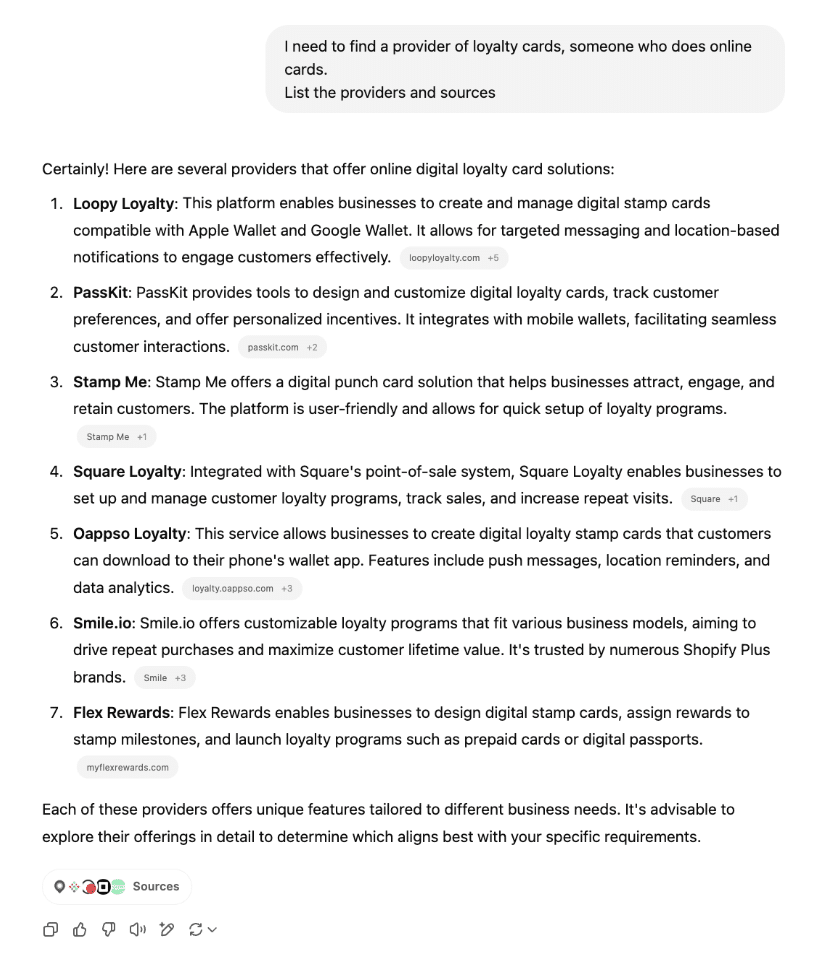Olga Mykhoparkina
Founder, CEO

Olga Mykhoparkina
May 20, 2025Search is changing—and not gradually. It’s flipping on its head.
For years, traditional SEO was about keywords, rankings, and landing that prime spot on traditional search engines like Google. You wrote for search engines so users could find you. That was the deal.
But now, instead of just matching keywords, search engines are developing to understand user intent. And it’s not just Google tweaking its algorithm quietly. We have large language models (LLMs) like ChatGPT, Gemini, and Microsoft Copilot stepping in, delivering direct answers that sometimes bypass the old “10 blue links” format entirely.
That’s great for users—they ask a question, get a precise answer, and avoid digging through multiple pages.
So what does this mean for brands and SEO pros who’ve mastered traditional SEO practices? If AI tools are becoming the new gatekeepers of information, where does that leave websites and search engine optimization?
Is SEO dead? Or is there a smarter way to show up in the evolving landscape of search discovery?
For years, traditional SEO revolved around three pillars: keywords, backlinks, and addressing user intent. You optimized on-page content, structured your site with schema, internal linking, and meta tags to help search engines crawl and index your site effectively.
Landing a featured snippet—the small box above regular results—was the holy grail of organic search traffic.
Search engines would crawl your content, index it, and rank pages based on how well they matched queries. Your focus was on keyword density and search engine rankings.
But what’s happening now?
Large language models (LLMs) don’t search the web the way traditional search engines do. They generate answers based on vast training data instead of returning a list of links.
This shift means people are not just searching; they’re conversing with AI. The search discovery process is more direct and personalized, reducing the need for users to click through multiple pages.
That’s a game-changer. Users might get AI generated answers right away—no click needed. Your brand might be mentioned or may not.
Search engines are no longer the only way users find information. Instead, AI search and large language models dominate, changing how brand’s visibility is measured.
Dig deeper: LLMs.txt: The New SEO Hack for AI-Powered Search
| Aspect | Traditional SEO | LLMO / AI search |
|---|---|---|
| Content access | Indexed content accessed via links | Content generated or summarized by AI |
| Rankings | SERP position dictates visibility | Inclusion in AI answers/citations |
| User interaction | Clicks drive traffic to website | Direct answers reduce clicks |
| Optimization focus | Keywords, structured markup | Semantic understanding, natural language processing |
| Tools & techniques | Schema markup, meta tags | Large language model optimization (LLM optimization) and context understanding |
SEO strategies need to develop. Traditional SEO still matters for search engines and driving search traffic, but optimizing for large language models and AI search requires new tactics:
Learn more: SEO vs GEO: Why Your Content Might Be Invisible in AI Search (And How to Fix It)
In 2025, search engines and large language models coexist. Users expect fast, accurate answers, whether via a link or a direct response from an AI assistant.
To succeed, marketers must blend traditional SEO techniques with LLM SEO approaches. Understanding the difference between traditional SEO practices and LLM optimization will help you maintain and grow your organic search traffic while adapting to the rise of AI-driven search tools.
Remember, optimizing for large language models (LLMs) is not just about keywords anymore—it’s about understanding context, user intent, and creating content that is useful enough to be cited by AI search assistants.
If you want your brand to maintain a strong presence in this shifting landscape, embrace both traditional SEO and large language model optimization strategies. This dual approach will maximize your visibility across search engines and large language models, ensuring your content reaches users wherever they look for answers.
We help B2B SaaS brands rank where it matters—in search and AI. Work with us
User behavior is shifting dramatically. More and more, people are turning to virtual assistants like ChatGPT instead of traditional search engines. You type a question, and instead of clicking through multiple web pages, you get a direct answer, often in a neat paragraph—no need to jump from site to site.
This isn’t just anecdotal. By 2025, nearly 60% of Google searches end without a single click to an external website. A 2024 Gartner study predicts over 25% of all search interactions will happen through generative search tools by 2026.
With Google’s AI Overviews, this trend accelerates further. In March 2025, 13.14% of all Google queries triggered an AI Overview, up from 6.49% in January. Most notably, 88.1% of these are informational queries—users get direct, authoritative answers for questions they used to research across many sites.
Industries like Science (+22.27%), Health (+20.33%), People & Society (+18.83%), and Law & Government (+15.18%) see the fastest growth in AI Overview coverage, reflecting a shift toward high-trust content.
This rise in zero-click searches is confirmed by Rand Fishkin’s SparkToro study, showing that around 59% of searches in the U.S. and EU in 2024 resulted in no clicks.
For example, one client of ours experienced a sharp drop in organic traffic as visits were redirected to LLMs instead. Their LLM traffic increased as organic visits declined, highlighting how users now interact differently with search results.

See also: Schema & Structured Data for LLM Visibility: What Actually Helps?
Large language models don’t just answer simple questions like “weather in Paris.” They handle complex, exploratory user queries such as “What’s the difference between LLMs and traditional SEO?” or “How do I optimize my site for AI Overviews?”
These models draw on vast training data and pull from many sources to generate comprehensive, concise responses—answers that once required visiting multiple sites and reading extensively.
Tools like Perplexity combine real-time web browsing with conversational replies, Gemini handles follow-up questions, and Bing Copilot provides citations without forcing users to click unless they want to. This is zero-click search at scale: users interact differently, asking questions and getting immediate answers, often without visiting your web pages.
SEO isn’t dead. But marketing teams need to rethink their approach. Optimizing solely for search rankings on Google’s crawler is no longer enough. Today, you must consider how LLMs prefer content that’s clear, authoritative, and structured for easy summarization by AI.
Structured data, internal links, and clear signals of semantic relevance remain crucial—not just for traditional SEO, but also for helping AI understand and cite your content.
Your content must satisfy search intent better than ever to earn brand mentions in AI-generated answers and digital PR channels. The new goal is inclusion in LLM-powered responses and Google AI Overviews—not just clicks.
Our clients have seen firsthand how creating content optimized for large language models drives visibility.


These examples show how SEO professionals can leverage well-structured, authoritative content—supported by E-E-A-T principles—to capture attention from both search engines and generative search tools.
To stay competitive, marketing teams must blend traditional SEO tactics with strategies focused on AI-powered discovery. This means investing in structured data, understanding user queries, and creating content that satisfies semantic relevance and search volume trends while earning citations and brand mentions in AI-driven results.
Learn about how to create LLM referral report in GA4
Want your brand to show up in LLM responses, not just on Google’s search results page? Here’s how to create content that gets noticed—and cited—by AI models and authoritative sites.
LLMs love clear, fact-based snippets. Think of your content as a cheat sheet for an AI assistant: short, direct statements, stats, and answers that are easy to grab and rephrase. The more “fact-checkable” your quality content, the better your chances of getting an authoritative answer. Use upfront summaries, bullet points, and Q&A sections to highlight your expertise and make it easy for AI to create content citations.
Reputable sources and authoritative sites get preferential treatment by AI systems. Build your brand as a trusted resource through detailed guides, case studies, or thought leadership. This boosts your brand recognition and improves your website’s visibility in both traditional search results and LLM visibility. Consistency in messaging across your site and social media also helps establish your authority.
Adding structured data and schema like FAQ, How-To, or Article markup helps AI models better understand your page’s content. This technical step makes your pages easier for LLMs to parse, increasing the chances your content is pulled for direct answers.
LLMs don’t only index your website—they crawl forums, Reddit, Quora, and LinkedIn. Repurpose your insights in these places to build referring domains and increase your referral traffic. The broader your content footprint, the more your expertise will be recognized by AI.
Tracking your LLM visibility and how your brand appears in AI assistant responses helps you understand the feedback loop between your content and AI-driven discovery. Note that AI responses may vary per user, so use multiple checks beyond personal accounts.
Read also: Do G2 and Capterra Reviews Influence ChatGPT Rankings? [2025 Research]
Don’t rely on one-off articles. Cover your topics comprehensively with beginner guides, expert interviews, and case studies, all interlinked. This structure signals to AI that your site is a trusted, connected resource, improving your authority and increasing the chance of being cited.
Reputable sources stand out by sharing unique, verifiable data—surveys, fresh stats, or expert opinions. LLM optimized content that offers original insights is more likely to earn brand recognition and appear as an authoritative answer in search results and AI responses.
AI systems prioritize content freshness. Regularly update your articles, add new examples, and include “last updated” dates. Fresh, relevant content signals to both humans and AI models that your site is a reliable information source.
Make your content easy to scan: short paragraphs, bullet points, clear headings, and conversational phrases help. The more LLM optimized content is scannable, the better its chances to appear in Google Gemini or other AI assistant summaries.
Many AI systems have a knowledge cut-off date. For fast-changing industries, focus on platforms with real-time browsing or sources LLMs frequently retrain on to ensure your business information stays current in AI responses.
Bonus tips:
The goal is not just to rank in search results, but to be referring domains that LLMs trust and cite. Being found isn’t enough—you’ve got to be worth quoting.
Learn more: From Blog Posts to Answers: Repurposing for AI Assistants
Short answer: yes. Just not in the same starring role.
Google isn’t ditching search results. Instead, we’re seeing a mashup: AI assistants and traditional listings appear side by side. Sometimes users get a direct authoritative answer from AI models, sometimes a list of websites, and sometimes both.
Traditional SEO is still useful. But now it fuels two things:
In other words, SEO isn’t going away—it’s sharing the stage with AI-driven platforms. The better your SEO and quality content, the more likely your site becomes the reputable source that gets cited and summarized, no matter where the question is asked.
This isn’t an either-or scenario. If you want to stay discoverable, you can’t pick sides. It’s SEO and LLMs, all the time. Ignoring either channel means missing out on valuable traffic from your target audience.
Write for both bots: Google’s crawler and AI assistants. Keep publishing LLM optimized content that’s clear, structured, and genuinely helpful. Use simple language and conversational phrases. Add schema markup to make your content worth citing—not just clicking.
Whether a human, a crawler, or an AI assistant reads your page, the goal is the same: to be the trusted voice they want to reference.
You might be interested in: 10 Content Formats That Get Picked Up by LLMs
But if you focus on content generation that prioritizes quality, clarity, and authority, you’ll be ready for whatever comes next. It’s not just about ranking in search results anymore. It’s about showing up where the answers actually are.
Want your business information and brand to show up in Google Gemini and other AI summaries? Quoleady helps SaaS companies create content that gets cited, not just ranked.
We’ve helped dozens of clients boost their brand recognition and improve their LLM visibility by optimizing content for both SEO and AI-driven platforms.
Traditional SEO focuses on ranking in search results, while optimizing for LLMs means crafting clear, authoritative content that AI models can easily understand, cite, and reuse in their responses.
Absolutely! By adding structured data, clarifying key points, and making answers more direct, you can turn your current content into LLM optimized content and increase its chances of being featured.
AI systems also scan public platforms like Reddit, forums, LinkedIn, and other community sites. Sharing your expertise across these channels builds referring domains and expands your footprint in the AI discovery space.
Use specialized tools to measure success by monitoring AI citations, changes in traffic, and your presence in AI-generated answers. This feedback loop helps you optimize your strategy over time.
This balanced approach, mixing SEO fundamentals with LLM-centric tactics like targeting long tail keywords and engaging on AI driven platforms, is your best path forward in today’s search landscape.
Work with Quoleady to make your SaaS brand visible in both search and AI results.
Let us know what you are looking to accomplish.
We’ll give you a clear direction of how to get there.
All consultations are free 🔥
